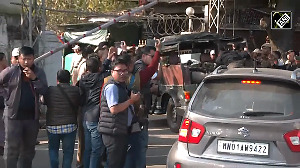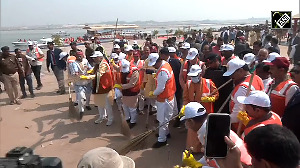Behind the glossy exterior of five world titles and the trickery of Ronaldinho, Brazilian domestic football presents a very different reality.
Financial difficulties, chaotic administration and violence on the field and off mean that most players and coaches jump at the first offer to move abroad, even to less fashionable soccer destinations such as Ukraine, Switzerland, Turkey, China or Qatar.
Far from Brazil's international reputation for artistry and attacking play, Brazilian domestic football is regarded as being among the most violent in the world, where 60-foul matches are common.
Almost every week, and sometimes every day, Brazilian domestic soccer conjures up scenarios almost unimaginable elsewhere.
Recently, Flamengo players fought with riot police at the Maracana stadium on the same day that Cabofriense and Madureira were benefiting from a mysterious bus breakdown.
It was the last matchday in the qualifying stage of the Carioca championship and all games were supposed to kick off at the same time.
TURNING UGLY
Yet Madureira's alleged transport problems on their way to Cabo Frio delayed the kick off for more than half an hour.
As a result, they and opponents Cabofriense played the last half hour of the game knowing that a draw would send both teams into the semi-finals.
The outcome, perhaps predictably, was a tame goalless stalemate with barely a shot on goal.
Back at the Maracana, Flamengo and Vasco da Gama's game turned ugly.
One scuffle between the players prompted riot police to run on to the field followed by a legion of reporters, photographers, officials and self-styled security men.
At one stage, there were more than 100 people on the pitch where a professional football match was supposed to be taking place.
When the final whistle went, trouble broke out again. Flamengo players scuffled with police, one officer was seen using pepper spray to quell the trouble. Another grabbed a Flamengo player by the neck and held him down with his truncheon.
FINANCIAL DIFFICULTIES
During matches themselves, referees use yellow and red cards sparingly and, even where they do punish rough play, they are often undermined by tribunals set up to examine the incidents that led to the sendings off or bookings.
The so-called suspensive effect allows any player who gets more than the automatic one-match ban to appeal and to keep on playing until the new hearing takes place.
Santos goalkeeper Fabio Costa was the latest to benefit as he carried on playing despite receiving a five-match ban for punching an opponent.
The Brazilian season kicks off with a plethora of regional competitions, using hugely complex formats that often change from year to year.
Rio de Janeiro's Carioca championship, for example, consists of two separate phases with the winners of each meeting in the final.
In the second phase, the teams are bewilderingly split into two groups but play only games against sides from the other group.
Brazil appeared to take a step forward in 2003 when, for the first time, the national championship was run on a conventional league format and extended to take up most of the season.
However, the competition, which runs from April to December, routinely suffers a mass exodus of its top players during June and July when the European transfer market opens for business.
DONKEY CHANT
Meanwhile, the state competitions continue as a kind of season curtain-raiser. This means that even before starting their 38-match programme in the Brazilian championship, teams have played up to 20 matches.
A demand for immediate success makes coaching a thankless task and when the dreaded chant of "donkey, donkey" echoes around the stadium, the coach knows his days may be numbered.
The turnover is extraordinarily high, with an average of over 50 coaching changes per season.
Fluminense, for example, are already on to their third coach since the 2006 season started in January. Atletico Paranaense, generally seen as one of the better-structured clubs, have employed six coaches since last April.
Zico, one of the top players in Brazilian history after Pele and currently coach of Japan, said he would never come back to work in his homeland under the present circumstances and suggested fans should be punished for the donkey chant.
"Everybody has a laugh and enjoys it, but it's absurd," he said earlier this month.
"It's tough to go home and look at your kids and your family after being called a donkey.
"I'm never coming back while this sort of thing goes on."
Pele famously described soccer as "the beautiful game" and just about every football fan in the world would agree that Brazil are capable of playing it more beautifully than anyone else.
Usually at a World Cup, and often a version far removed from its ugly relation back home.








 © 2025
© 2025